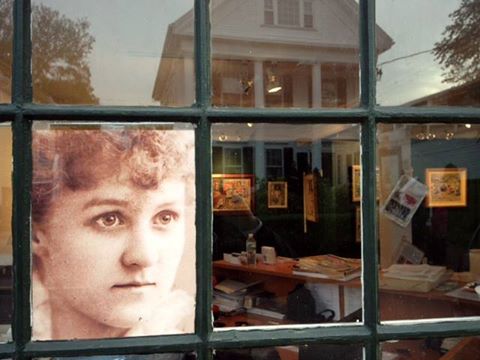Larkin Gallery, Inc.
405 Commercial Street
Provincetown, MA 02657
508.487.6111
Larkin Gallery, Inc.
586 Main Street
Harwich Port, MA 02646
508.487.3111
Larkin Gallery Director's Notes: Edith Lake Wilkinson's Return to Provincetown
Provincetown has a rich history beyond its designation as America’s oldest continuing art colony. Home to generations of Portuguese, a fabled, now faded fishing industry, poets, writers, innumerable fascinating characters running from something or other, not least, the law, and, of course, one of America’s premier gay and lesbian resort communities. The natural beauty, the peculiarly narrow sandy extension of land reaching away from the rest of the country and the surprising mix of people make Provincetown one of the most interesting and inspiring places on earth.
When I first read about Jane Anderson’s dream to bring Edith back to Provincetown, I was intrigued. As I read more about Edith’s history and what is known about how and where she figured into Provincetown’s art history, I knew I wanted to be a part of this historic and triumphant, albeit bittersweet return.
Throughout history, many people have fallen in love with Provincetown, with Cape Cod’s arresting, special “light,” the sense of freedom here, nature’s beauty, the acres of protected, unspoiled dunes and an atmosphere that fosters creative energy and output. It’s easy to imagine that Edith came to Provincetown with all of this in mind. She joined the Provincetown art community spending part of each year here from 1914 until she was committed to an asylum. Like so many before and after her, Edith found community in Provincetown and the art she produced here has a life, a palette unique within her overall body of work.
When I referred to Edith’s return as “bittersweet,” it was because it comes at a time when changes in Provincetown are, and not for the first or, probably, the last time, threatening some of the very values that people like Edith came here to find. Artists in increasing numbers find it financially impossible to call Provincetown “home” and leave. Future generations may see Provincetown as less of an art colony and more of a vacation resort and not “home” and the attendant investment that “home” suggests. As we witnessed the impact of a declining fishing industry, “locals” moved farther up Cape and off Cape, thereby diluting a community of fishing families, forever altering a hard but familiar way of life for several generations. The impact on the community from the decline of this once prosperous business was not just economic, but social as well. Families dispersed, common histories dissolved.
Provincetown has also witnessed a social change that, while positive, will impact the town economically, socially, and artistically in ways not yet considered. LGBTQ people today have greater opportunities to live, work and vacation in many other safe and welcoming places rendering Provincetown, once an LGBTQ mecca, less significant, particularly for the younger generations coming out and growing up.
Edith, like so many others who have followed, came here to pursue a dream and, like so many since who, for whatever reason have chosen to leave or been forced to leave, has left a legacy that extends beyond tangible contributions. Edith’s return not only gives us the long withheld opportunity to see the world as she saw it nearly a century ago, it gives us something more. We’ve gained a glimpse into history, not just of an artist who came to Provincetown with her life companion, women at the dawn of the new century, but of the plight of a woman whose control over her own destiny was forcibly taken from her. We’ll never know what more we might have known of Edith’s work, of her vision, had her history continued along the line that she believed she was traveling. Instead we’ll celebrate what has finally come home, at last, and hope that history will guide us to carefully and thoughtfully consider the future of this place that so many have cherished and been fortunate enough to have called home.
-Stephen M. Briscoe
Gallery Director
Larkin Gallery, Inc.

